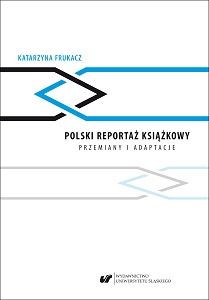Polski reportaż książkowy. Przemiany i adaptacje
Polish book reportage. Changes and adaptations
Author(s): Katarzyna Frukacz
Subject(s): Language and Literature Studies, Studies of Literature, Polish Literature
Published by: Wydawnictwo Uniwersytetu Śląskiego
Keywords: Polish book reportage; book market; adaptation; media convergence; aggregateness; genre and media hybrids; reportage-as-a-project
Summary/Abstract: The monograph provides an analysis of the main factors determining the market- based and aesthetic status of old and contemporary Polish book reportage. The reflection aims at discussing the origin and the consecutive stages of the development of this media form in Poland, from the second half of the 19th century to contemporary times. One of the most significant issues discussed in the dissertation refers to the current generic transformation of these non-fiction books, as well as their new promotion and distribution policies in the digital era. Moreover, the objective of the research is to examine possible directions of further evolution of Polish book reportage, resulting from its adaptation to the standards of convergence culture and characteristics of the postmodern age. The dissertation consists of five chapters. The first two present a diachronic reconstruction of the history of reportage books on the national publishing market. Chapter one concerns the period from the partitions of Poland to the political transformation of the country in the 20th century and examines the circumstances that have led to symbiotic relation between the press and book forms of the genre. Furthermore, it describes how book reportages became separated from texts printed in the press after World War II. This issue is further discussed in chapter two, whose overall theme is the situation of Polish book reportages after 1989 (with special emphasis on their entanglement in commercial mass media discourse and their relationship with other forms of artistic expression). The above-mentioned problems also determine the subject of the next two analytic and interpretative parts of the monograph. Chapter three examines the influence of media convergence on the poetics of book reportages at the beginning of the 21st century. Their transformation is presented here as a typology encompassing three strategies of adapting reporters’ prose to digital conditions. These strategies are based on the notions of commercialization, interactivity and subjectivity. Chapter four, which contains an analysis of some chosen publications by Mariusz Szczygieł, Jacek Hugo-Bader and Filip Springer, provides additional details on the adaptation process defined in the previous part of the book. Works by these authors are discussed as examples of two complementary tendencies, compatible with contemporary transformations of the publishing sector. The first tendency concerns creating reportage books that are hybrid texts, while the second one aims at transforming reportage stories into intermedia and transmedia projects. Both processes are associated with the aggregateness category adopted for discussion purposes and considered as a formal determinant of recent Polish book reportages. The aggregateness concept also makes up the leitmotif of the last chapter, which provides the final assessment of formerly discussed phenomena. The aggregateness is examined here as a feature constituting today’s cultural reality, whose fragmentary and accumulative shape results as much from the media convergence’s impact, as from the axiological and aesthetic assumptions of postmodernity. The analysis embedded in this context concerns referential aspects of the contemporary reportage testimonies. In the concluding remarks, the evolution of methods of perceiving reality, resulting in the progressive subjectivity of reporters’ accounts, is recognized as the main source of the changes and adaptations of Polish book reportages mentioned in the title of the monograph.
Series: Edytorstwo, Publikowanie, Bibliotekoznawstwo
- E-ISBN-13: 978-83-226-3549-0
- Print-ISBN-13: 978-83-226-3548-3
- Page Count: 376
- Publication Year: 2019
- Language: Polish
- eBook-PDF
- Table of Content
- Introduction

